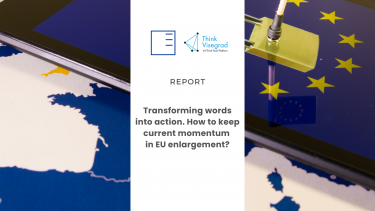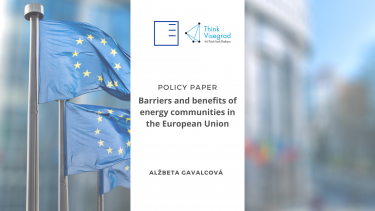Report | Transforming words into action. How to keep current momentum in EU enlargement?
On the 3rd of October, Think Visegrad in Brussels, represented by the Brussels Office of EUROPEUM Institute for European Policy, organized a discussion titled "Transforming words into action. How to keep current momentum in EU enlargement?". Experts from think tanks, diplomatic missions and EU institutions dwelled into the renewed focus on EU enlargement, including the initiation of accession negotiations with Ukraine and Moldova, the formulation of new strategies and financial incentives for candidate states, and reinforced commitments from the EU. The key challenge moving forward is ensuring that this momentum is sustained and translated into concrete, transformative actions that deliver measurable results.
Show more
Policy Paper | Barriers and benefits of energy communities in the European Union
Energy communities are an effective means to decentralize and renew our energy systems with sustainable solutions as they are usually based on renewable energy. They have already started emerging in 1970´s, yet there has been a significant increase in their development only in recent years, also in terms of their introduction into the EU legislation. Especially in Western and Northern European countries the concept already enjoys vast popularity. On the other hand, in Central and Eastern European countries (further referred to as CEE) energy communities are only beginning to emerge. The policy brief (based on literature and interviews with various stakeholders ) examines the benefits energy communities may bring, and more importantly, the main obstacles remaining in their way for greater evolution in the CEE region – and especially Visegrad countries (V4). As these initiatives progress, sharing the best practices will ensure the success of the community energy in the energy transition. Writes Alžbeta Gavalcová.
Show moreThink Visegrad Fellowship offer: Call for proposals 2024
The Think Visegrad platform, which brings together think tanks from the Visegrad countries, including the EUROPEUM Institute for European Policy, is offering eight visiting fellowships to non-Visegrad expert fellows for the period Summer/Autumn/Winter of 2024. The duration of fellowships varies from 6 to 8 weeks (based on agreement with the hosting institute).
Show moreThink Visegrad Fellowship offer: Call for proposals 2024
The Think Visegrad platform, which brings together think tanks from the Visegrad countries, including the EUROPEUM Institute for European Policy, is offering eight visiting fellowships to non-Visegrad expert fellows for the period Summer/Autumn/Winter of 2024. The duration of fellowships varies from 6 to 8 weeks (based on agreement with the hosting institute).
Show moreThink Visegrad conference - EU Enlargement Forum
On 10 and 11 April 2024, Prague will host a two-day conference entitled "20 Years of Reuniting Europe's East and West", organised by EUROPEUM Institute for European Policy in cooperation with the Ministry of Foreign Affairs as part of the Think Visegrad platform and the project (Re)uniting the East and West: Reflections on the 2004 EU enlargement (REWEU) supported by the International Visegrad Fund and the European Commission. The programme will also include the second edition of the EU Enlargement Forum.
Show more
TN.cz | Meeting of the Visegrad Group Foreign Ministers
The current format of the Visegrad Group lacks common topics; the group fragmented into two pairs that have different opinions in many areas, particularly regarding the issue of Ukraine. However, the interests of Hungary and Slovakia are not in conflict with others, despite what their leaders claim. The conflict in the Middle East, where the Czech Republic is in the minority in its full support of Israel, was also discussed on this meeting. Viktor Daněk, deputy director of EUROPEUM Institute, commented on the situation within the V4 for TN Live.
Show moreVisegrad/Insight | Tractors Trending: V4 Populists Appropriate the Farmers’ Protests Ahead of the EP Elections
The populist camps in the Visegrad Four countries have used the farmers' protests in their populist campaigns for the European Parliament elections in June. A fundamental change to the last EU elections in 2019 is visible in the politicians' messages towards the people, with social media taking over the classic platforms such as television, press or radio. Project Manager of Global Europe programme at EUROPEUM Institute, Oszkár Roginer-Hofmeister, wrote an article on this topic for Visegrad/Insight.
Show more
RTVS | The Future of the Visegrad Group
Differences on key issues between the leaders of the Visegrad Four countries are now being widely discussed in the context of the ongoing summit in Prague. How the relations between the countries will develop, whether we are heading towards the disintegration of the V4 or whether this is an eternal partnership of reason, was analysed by Žiga Faktor, Deputy Director and Head of the Brussels Office, for the RTVS podcast Z prvej ruky.
Show more
ČT24 | V4 summit in Prague brought questions about the groups' necessity
The new Polish Prime Minister Donald Tusk came to the Prague V4 summit asking whether the Visegrad group is still relevant. Cooperation on a high political level is complicated by the countries' different approaches towards the war in Ukraine. While the Czech Republic and Poland continue to support its interests with the same intensity, Slovakia and Hungary are reassessing them. Martin Vokálek, Executive Director of the EUROPEUM Institute, talked about the importance of the summit and the relations between Poland and the Czech Republic for ČT24.
Show more
Policy Paper | The Perception of Visegrad Group on Enlargement in light of the Russian War on Ukraine
A new policy paper, produced with the support of the Visegrad Fund project, analyses the views of the Czech Republic, Slovakia, Poland and Hungary on the further enlargement of the European Union. With the granting of candidate status to Moldova and Ukraine and the recognition of Georgia as a potential candidate in June 2022, the issue of reforming the EU accession process is becoming absolutely crucial and, in the context of the war in Ukraine, a divisive issue for the V4 countries. The authors of the publication are Jana Juzová, Ferenc Németh, Tomáš Strážay and Marta Szpala.
Show moreStaroměstské náměstí 4/1
Prague 1 - Staré Město
110 00
tel.: +420 212 246 552
email: europeum@europeum.org
https://www.europeum.org








